On November 11, 2022, the CAMPUS Asia Plus Staff Capacity Building Program, organized by the Chinese Secretariat of CAMPUS Asia, was held at Peking University with the support of the Department of International Cooperation and Exchanges, China’s Ministry of Education (MOE). Around 120 representatives from 70 universities in China, Japan, the Republic of Korea (ROK), and ASEAN countries attended the event via either in-person or virtual participation. Experts and scholars from the Socio-Cultural Affairs Department of Trilateral Cooperation Secretariat, the Research and Development Department of China Academic Degrees and Graduate Education Development Center, and the Higher Education Evaluation Center affiliated with the MOE, together with members of the Advisory Committee of the Chinese Secretariat of CAMPUS Asia, attended virtually.
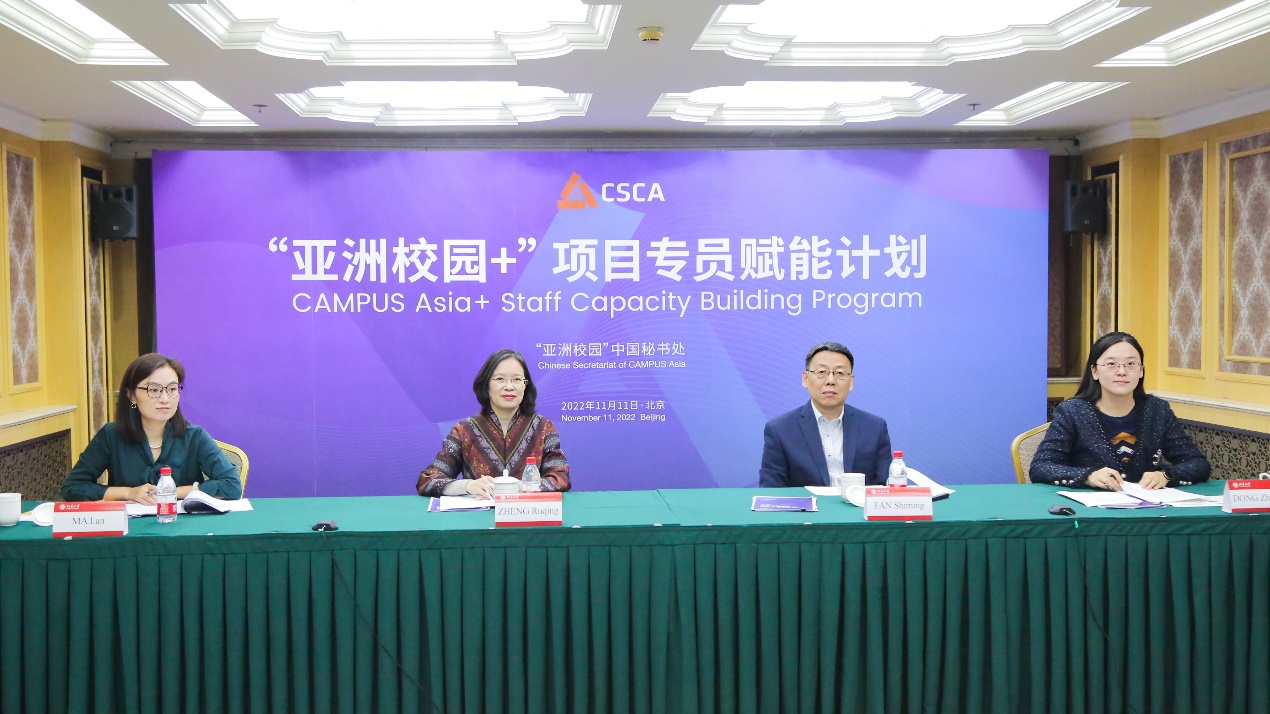
Offline meeting venue
Dong Zhaohua, Deputy Secretary-General of the Chinese Secretariat of CAMPUS Asia and Deputy Dean of the School of International Studies, Peking University, presided over the opening ceremony. Dong expressed her gratitude to the leaders, guests and colleagues who have long been caring for and supporting the CAMPUS Asia program and the Chinese Secretariat of CAMPUS Asia.
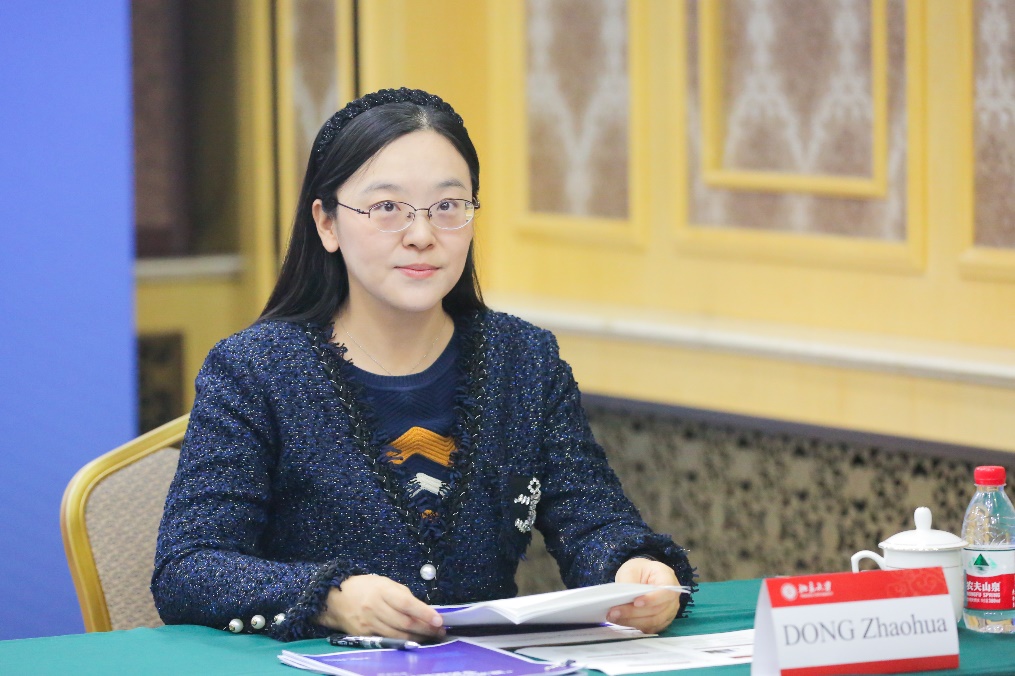
Dong Zhaohua presided over the opening ceremony.
Zheng Ruqing, Executive Secretary-General of the Chinese Secretariat of CAMPUS Asia and Deputy Director of the Office of International Relations, Peking University, said in her opening remarks that CAMPUS Asia has developed into a flagship program for higher education in China, Japan, and the ROK. Leading and driving educational cooperation and people-to-people exchanges in East Asia, it has played a significant role in promoting mutual learning and harmonious coexistence among Asian civilizations and earned wide recognition from all walks of life. She elaborated on the efforts made by the Chinese Secretariat of CAMPUS Asia to serve the sustainable development of the CAMPUS Asia program since its establishment, as well as the results thus achieved. She pointed out that the purpose of this staff capacity building program is to provide a platform of in-depth exchanges and professional guidance for institutions involved in the program and to facilitate discussions among staff on administrative difficulties. It is hoped that this event can empower the future-oriented development of CAMPUS Asia Mode 3 and the building up of an international management team.
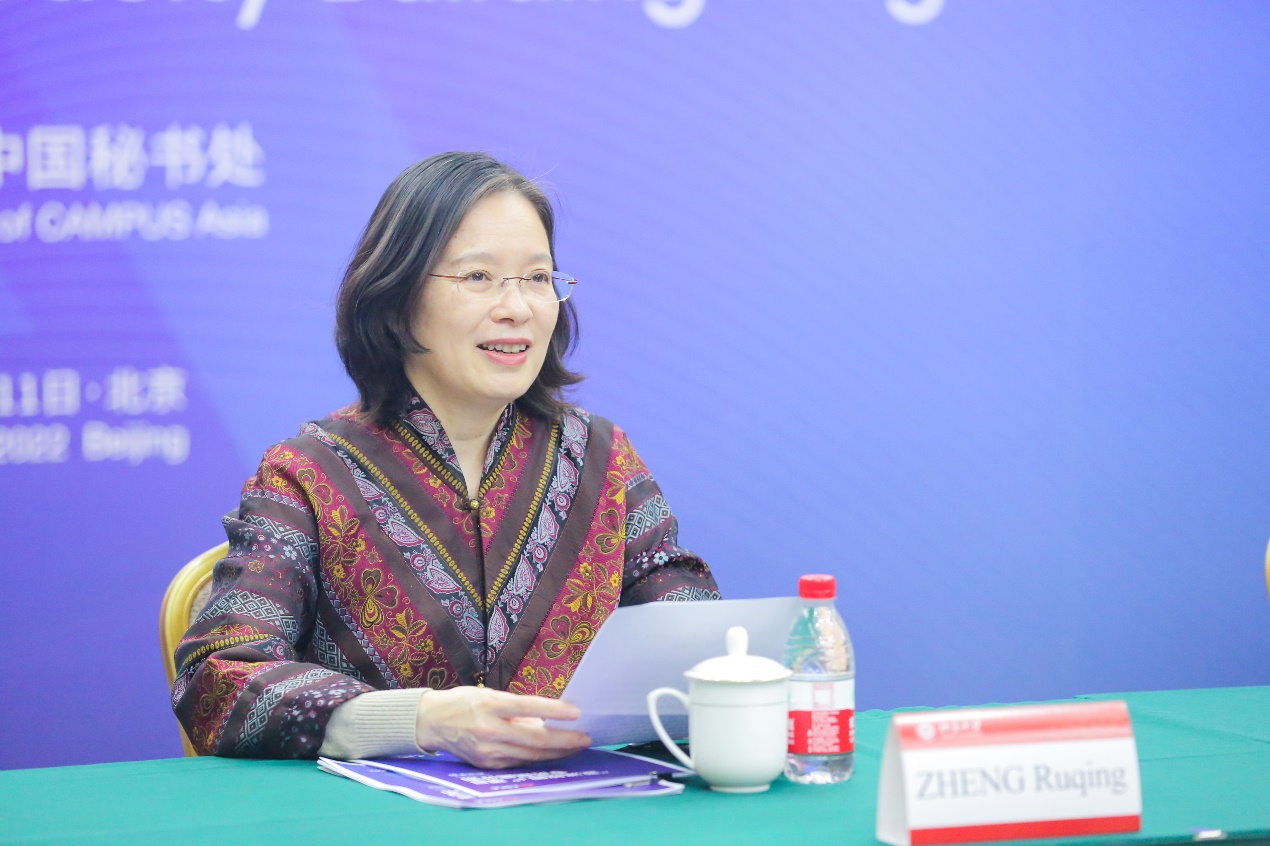
Zheng Ruqing delivered opening remarks.
Dong Zhaohua announced the launch of the official website of the Chinese Secretariat of CAMPUS Asia, and expressed the hope that the website can serve to improve the branding of CAMPUS Asia and provide a platform of exchanges and display for each subprogram.
Following the conclusion of the opening ceremony were keynote speeches in the morning session. Professor Kazuo Kuroda from the Graduate School of Asia-Pacific Studies, Waseda University, Japan, first delivered a keynote speech titled “Prospecting CAMPUS Asia and Asian Regional Cooperation in Higher Education.”
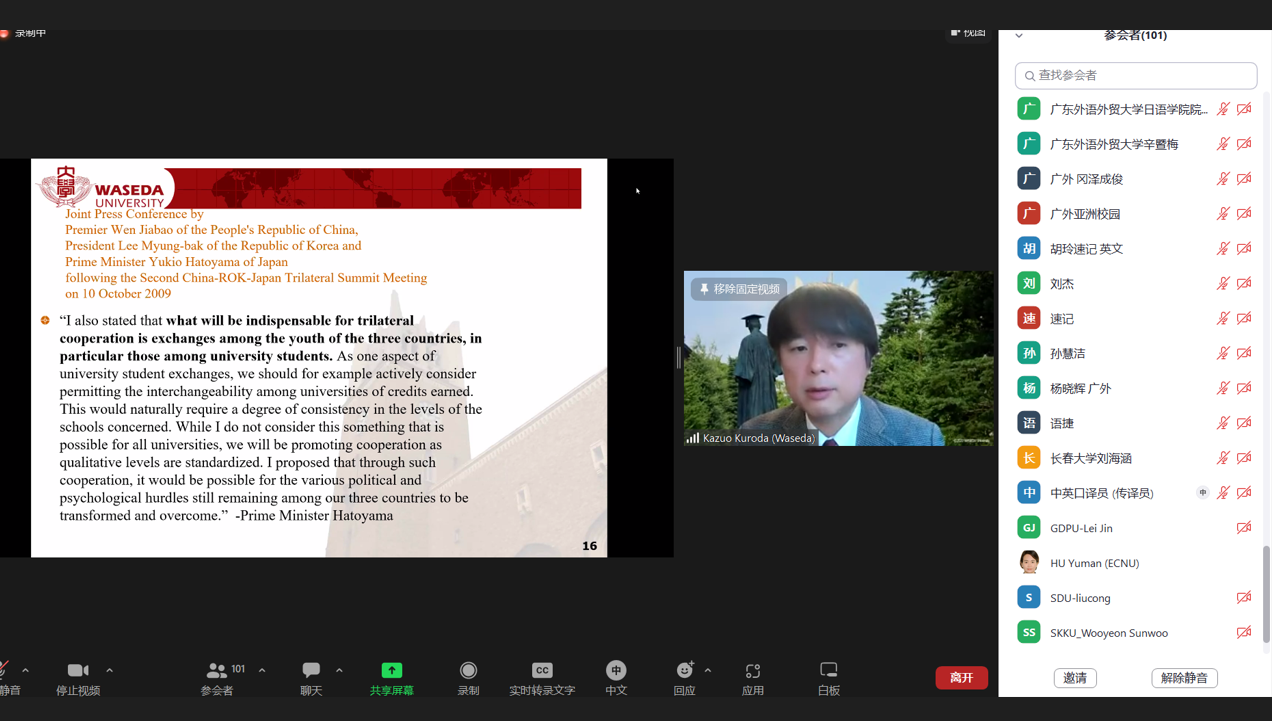
Kazuo Kuroda delivered his keynote speech.
Kazuo Kuroda summarized the historical evolution of Asian regional cooperation since the 1960s and pointed out that the internationalization of Asia’s higher education is an important part of the multi-level framework for East Asian regional cooperation. From the perspective of regional comparison, he noted that China, Japan, and the ROK had played a key role in Asia’s higher education. As the three countries are witnessing significantly faster growth in the number of admitted international students than European and American countries, student mobility among universities in East Asia has become one of the major forces driving the internationalization of higher education in the region. It is against this background that CAMPUS Asia was initiated. It took the lead in achieving institutional breakthroughs in quality assurance and credit transfer while continuing to lead the ASEAN International Mobility for Students (AIMS) program, University Mobility in Asia and the Pacific (UMAP), Asian Universities Alliance (AUA), and other multi-level educational cooperation frameworks among Asia’s higher education institutions. Kazuo Kuroda believed that Asia had explored a unique mode of regional cooperation on higher education. Compared with the “melting pot” of other regions in cross-border higher education cooperation, the mode of Asia is more like a “mosaic” which not only respects differences and diversity among Asian countries but also advocates connectivity through in-depth cooperation. Kazuo Kuroda proposed that in the post-COVID-19 era, countries should deepen international cooperation on higher education by taking the road of “knowledge diplomacy” and jointly respond to the challenges in the era of globalization. In the Q&A session, Kazuo Kuroda interacted with the audience on such issues as the status quo of Japanese students studying overseas and the characteristics of the higher education mode in Asia.
Professor Fan Shiming, Advisor to the Chinese Secretariat of CAMPUS Asia and Vice Dean of the Yenching Academy, Peking University, delivered a keynote speech titled “The Value of CAMPUS Asia” based on the survey on student experience and gains from CAMPUS Asia programs.
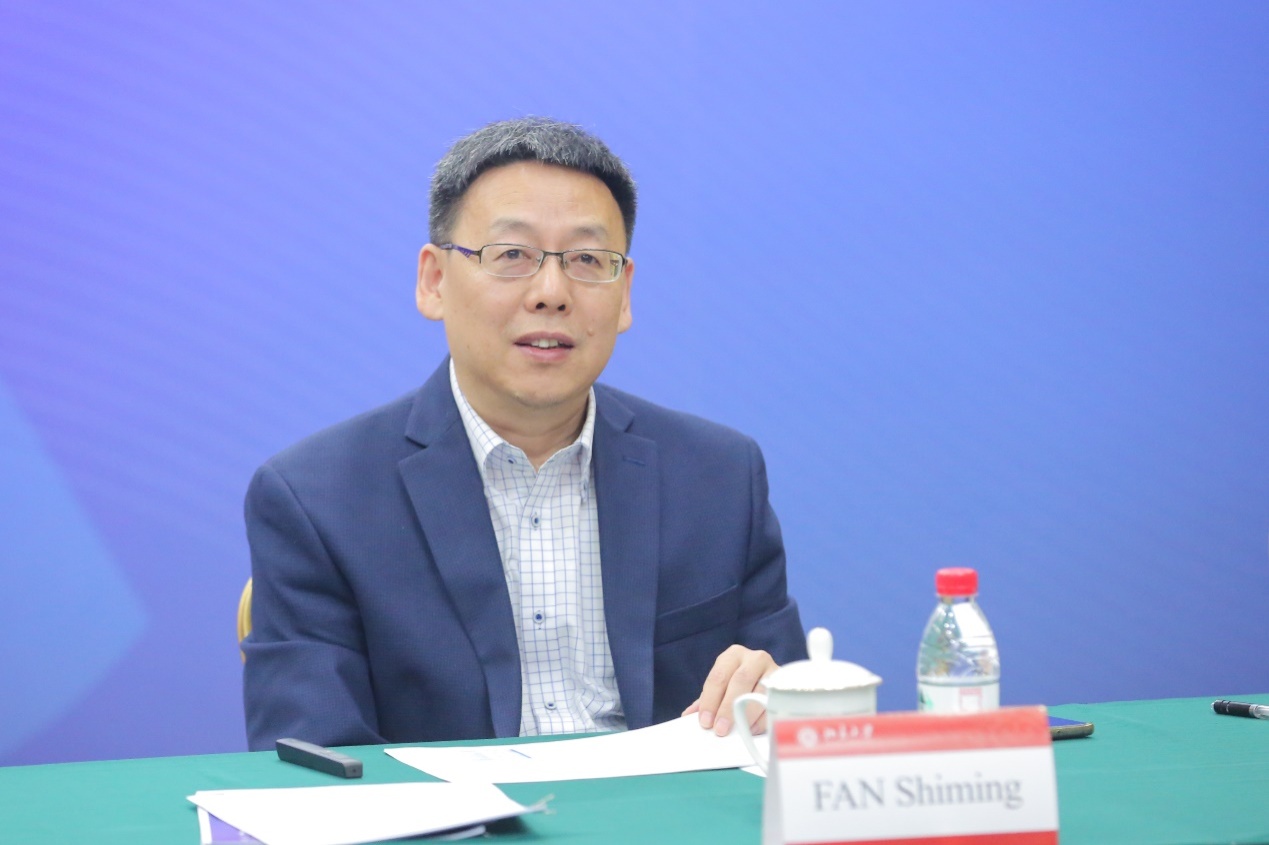
Fan Shiming delivered a speech.
Fan Shiming reviewed the history of CAMPUS Asia through its three modes, revisited its great progress in development, and discussed the achievements thus far. On this basis, he emphasized the importance of bolstering the establishment of CAMPUS Asia as the world and regional political landscape changes. Fan pointed out that the value of CAMPUS Asia is demonstrated in three levels, namely the macro, meso, and micro levels. At the macro level, the program helps promote cooperation and identification among China, Japan, the ROK, and other East Asian countries, which is of great value in maintaining regional political stability. It explores an Asian mode of cooperation in higher education, which is significant for global governance. It helps strengthen the young students’ understanding of their own country and other countries, and this carries great value for public diplomacy. At the meso level, the program serves to promote the legalization and institutionalization of international educational exchanges and cooperation. Based on the institutionalization and standardization of administration mechanisms and operation guarantee mechanisms across and within institutions, and by realizing the sharing and optimization of teaching and curriculum resources through mutual credit recognition, core courses, and workshops, the program is fundamentally conducive to Peking University’s effort to construct world-class universities and first-class disciplines (Double First-Class Initiative), train students for international organizations, and pursue the strategy of internationalization. This is highly consistent with the development trend and core concepts as proposed in the UNESCO World Higher Education Conference (WHEC2022). At the micro level, based on the interviews and survey of Chinese, Japanese and ROK students in the Report on Implementation Evaluation of the CAMPUS Asia Program and the Survey on Learning Experience and Outcomes with CAMPUS Asia Program, Fan pointed out that CAMPUS Asia is a valuable opportunity for students to enhance professional competitiveness, break cultural boundaries, rebuild mutual understanding, gain insights into national governance, and cultivate their regional identity.
The expert sharing in the afternoon session was presided over by Ma Lan, Deputy Secretary-General of the Chinese Secretariat of CAMPUS Asia and Director of the Exchange Student Division, Office of International Relations, Peking University.
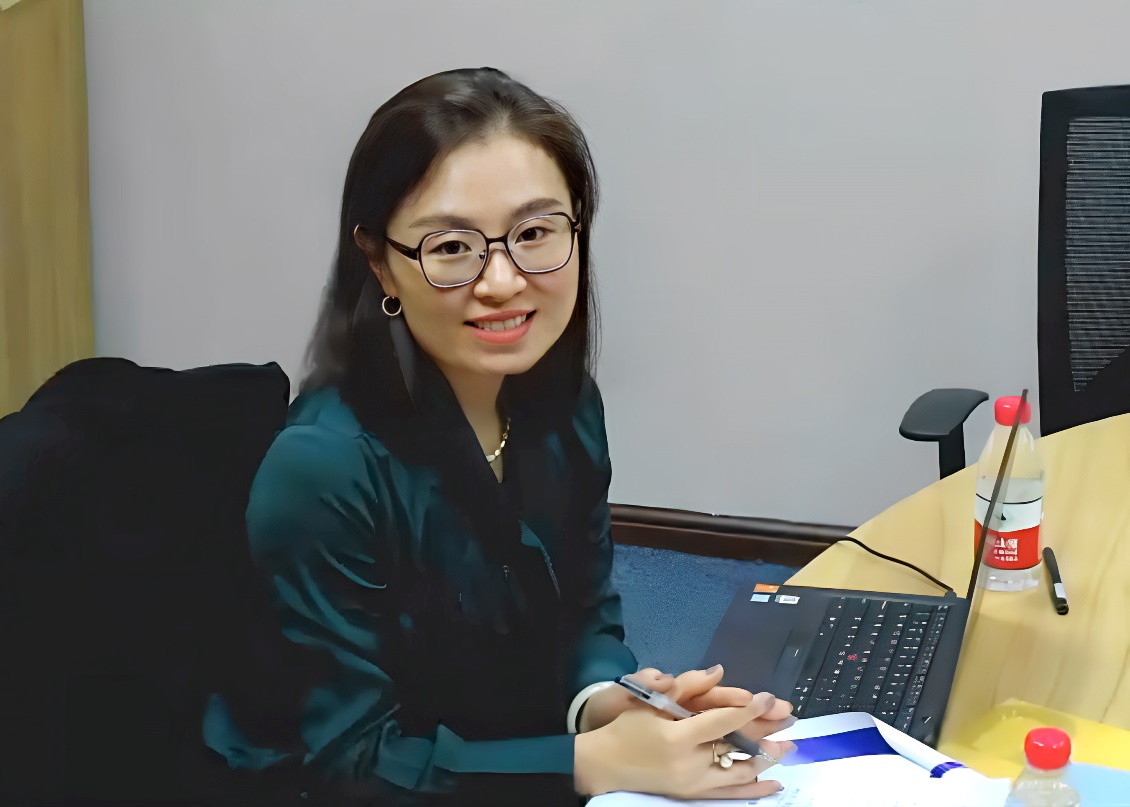
Ma Lan presided over the session in the afternoon.
At this session, Frederik De Decker, Head of the International Relations Office of Belgium’s Ghent University, was invited to share his views on international student mobility, with the Erasmus Program as the example.
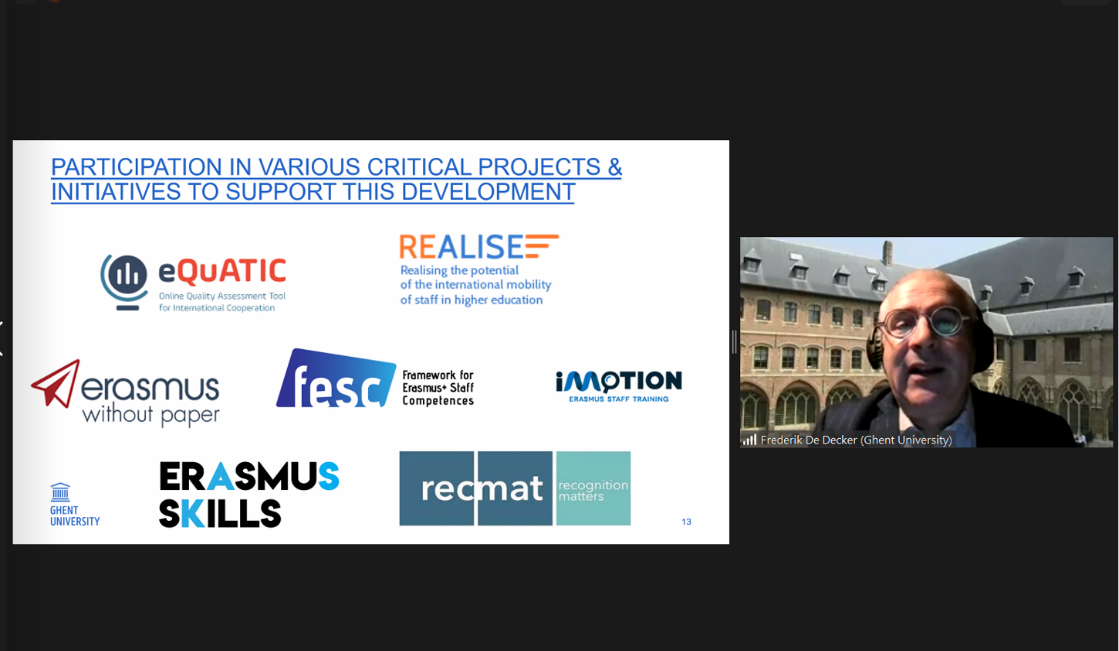
Frederik De Decker shared his views.
Frederik De Decker introduced the development of the Erasmus Program. From the three aspects of public awareness and recognition, digitization, and exchange quality enhancement, he briefed on how to promote the cross-border mobility of international students based on the current mechanism designed for the Erasmus Program. Specifically, the program works to improve public awareness and recognition through practices such as qualification accreditation, mutual recognition of credits, information support, and course combinations. It enables information exchanges in a safer and more efficient manner based on paperless program execution, and improves the quality of international cooperation with administrative, financial, and social support. In addition to the mutual recognition of credits, the Erasmus Program places a higher priority on the globalization strategy on a broader scale in a bid to achieve its educational goals.
Dr. Luo Ling, Deputy Director of Converged Media Center, Peking University and Deputy Dean of Lanyuan Center, Peking University, shared her views with the attendees in a speech titled “The Practice and Thinking of Peking University: Brand Building and Global Communication.”
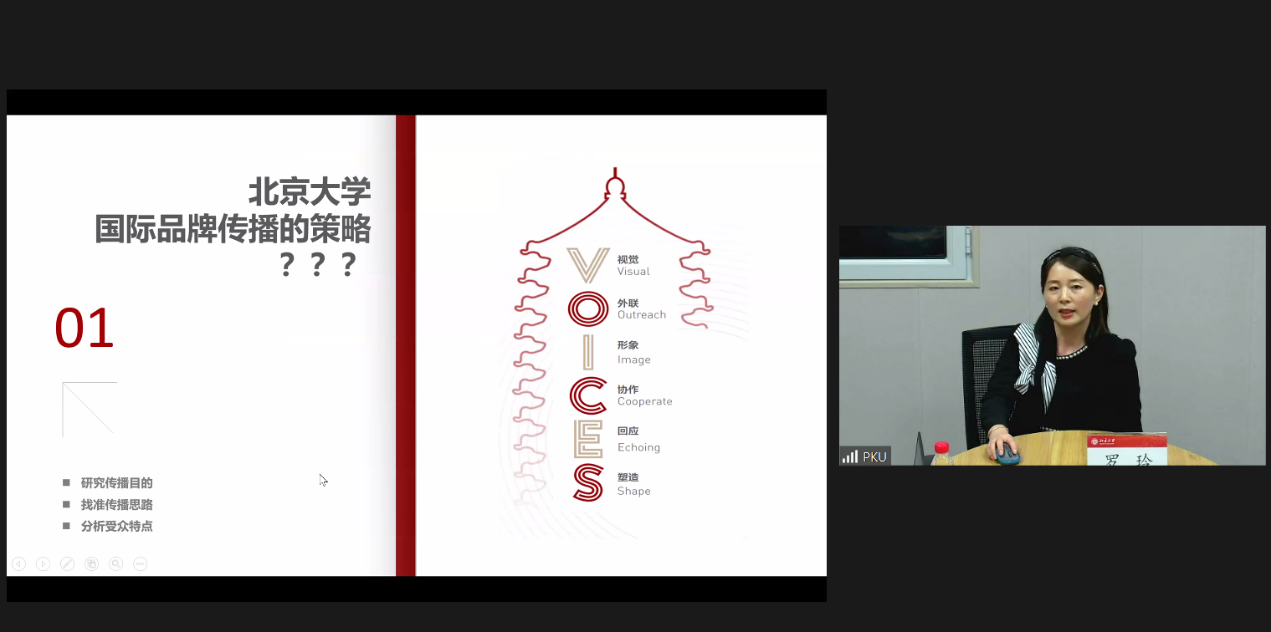
Luo Ling shared her views.
Luo Ling introduced the history and development strategy of international communication of Peking University. In terms of strategy, Peking University aims to develop a comprehensive development layout that features a bottom-up and inside-out approach, creating an image of innovation, leading, openness, uniqueness and diversity for the university. Luo elaborated on how to tell the international story of Peking University in the following aspects. The first is to start from the world of individuals to tell stories of Peking University from a personal perspective. The second is to look at the world of products to introduce the product image of Peking University. The third is to focus on the world of society to promote the coexistence and joint contribution of both the audience and the brand. The university works to shape a flagship approach to international communication through the five-step action of setting up platform, establishing image, building brand, assisting the planning, and creating a network. Combining the development history and achievements of Peking University’s media convergence platform, Luo introduced in detail specific cases of the university’s overseas communication, such as the content design of its official Weibo account and the building of a high-end speech brand, to explain the “five-step action”. Leveraging a myriad of methods, Peking University has succeeded in communicating brand stories and enriching brand connotations. In the Q&A session, the attendees engaged in heated discussions with Luo on how to improve platform interactivity and cohesion based on specific program practices.
Zheng Ruqing made closing remarks for the program. She expressed her sincere gratitude to Chinese and foreign experts and scholars as well as the representatives from participating institutions for their participation, and she looked forward to further collaboration with participating institutions of the CAMPUS Asia program to develop more open, integrated, and effective education in Asia.
Backgrounds:
The CAMPUS Asia Plus Staff Capacity Building Program is a professional training course offered by the Chinese Secretariat of CAMPUS Asia. With its modern and modular course design, it aims to build a high-level team of professionals, solve the bottlenecks in administrative support for the capacity building of the international team, and build with diligence a high-quality human development system for CAMPUS Asia. The program is expected to strengthen the leadership and influence of CAMPUS Asia over educational cooperation and people-to-people exchanges in East Asia in the new stage of its development.
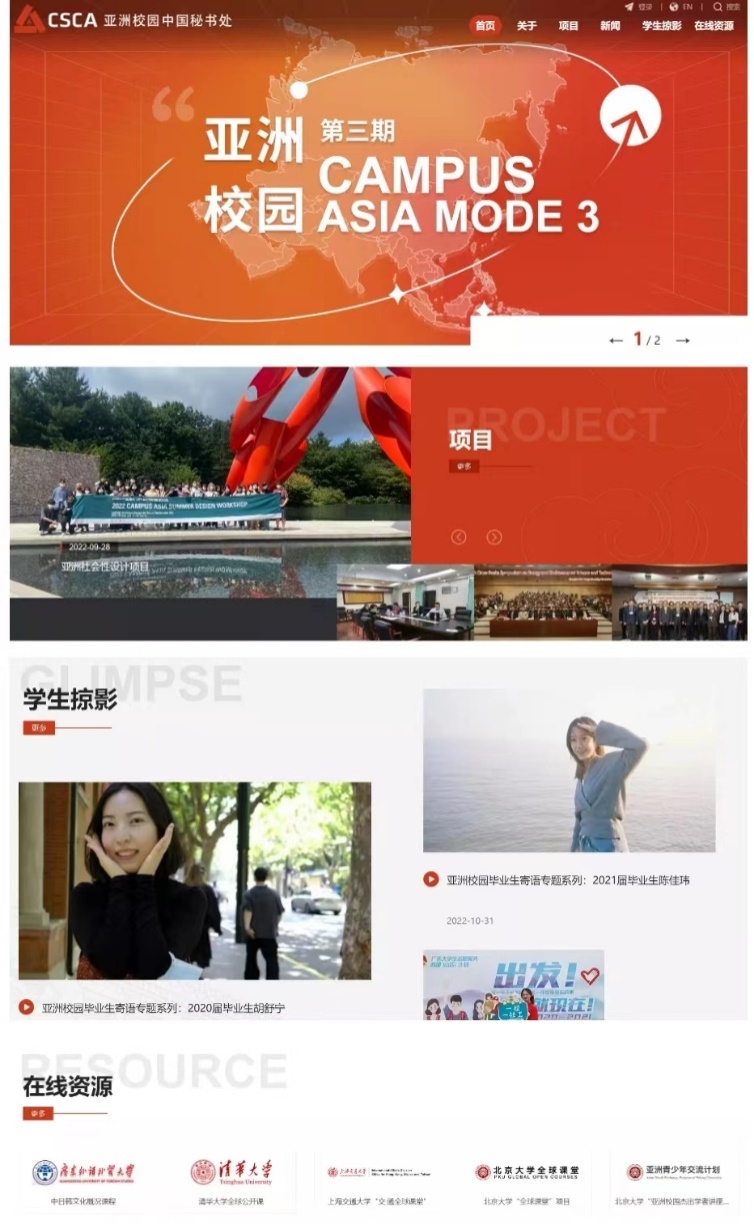
A snapshot of the website of the Chinese Secretariat of CAMPUS Asia
